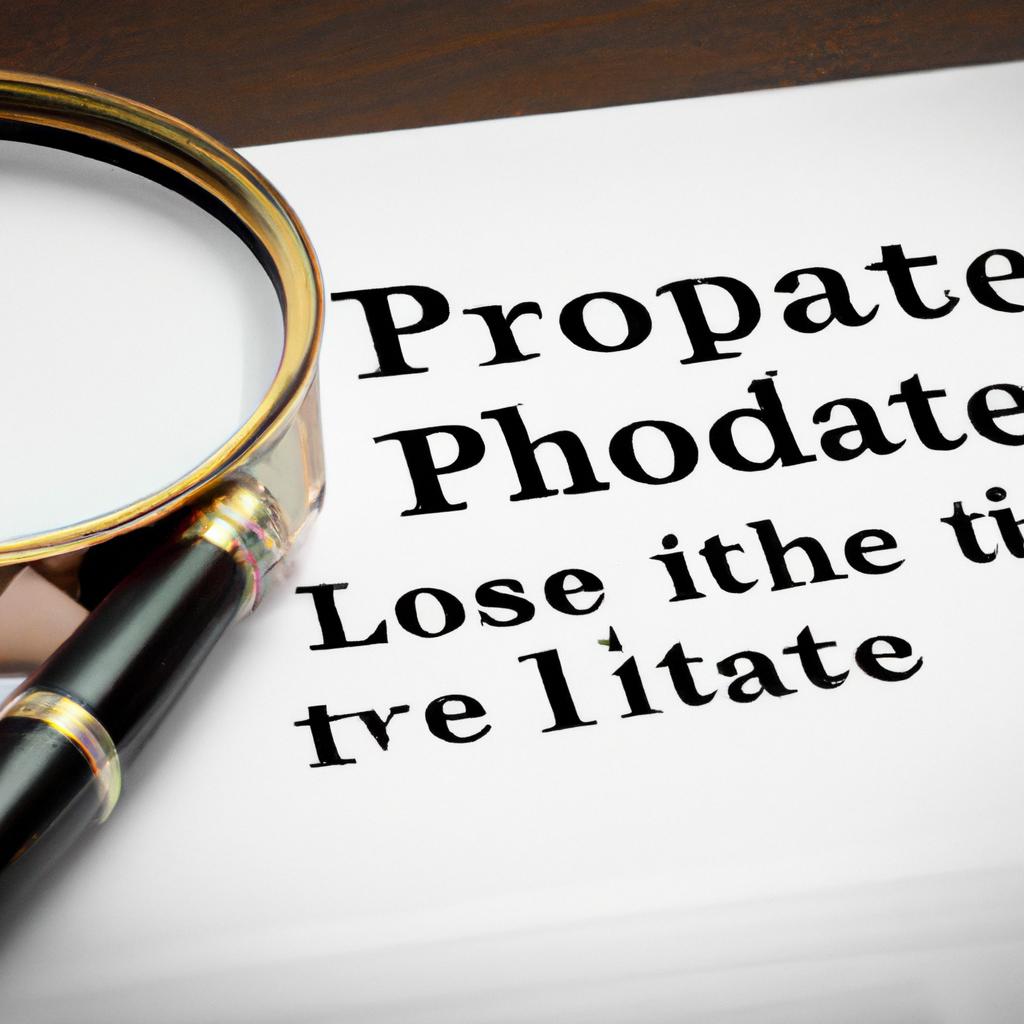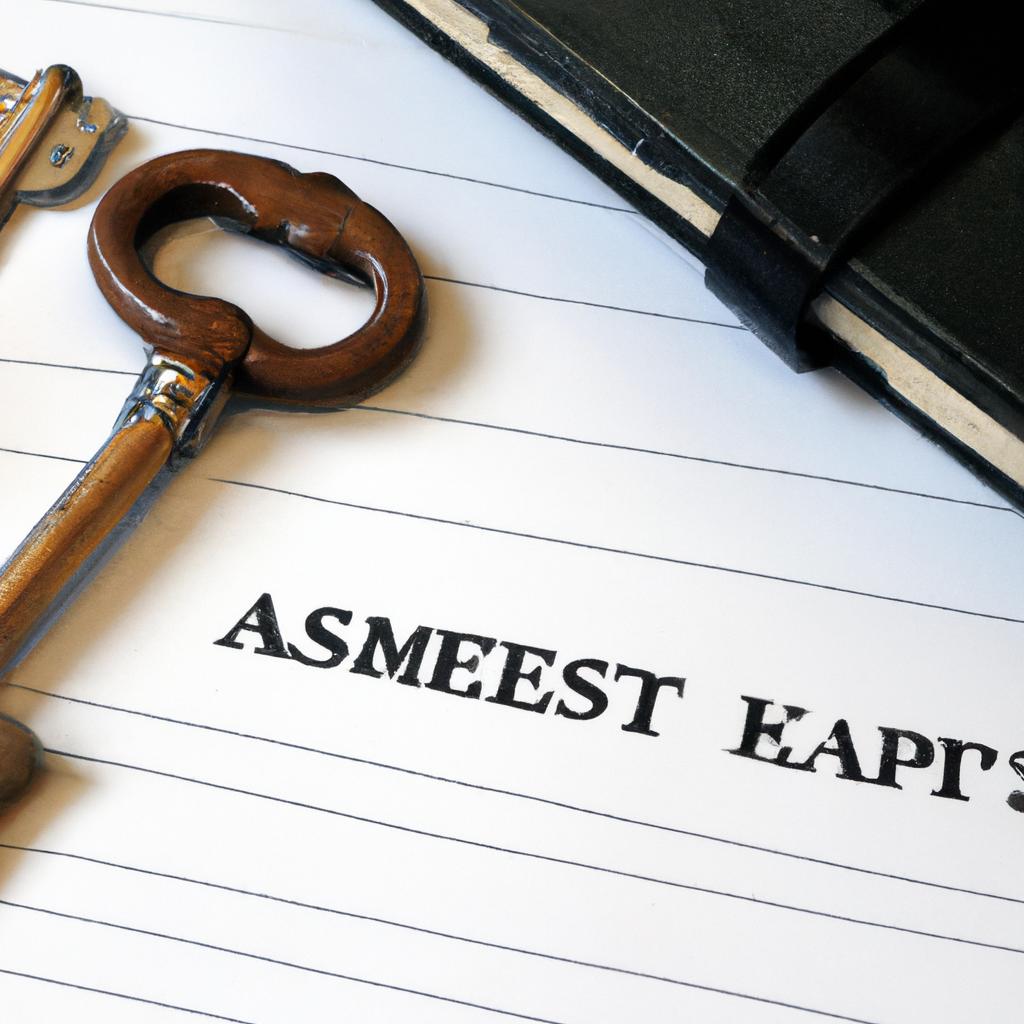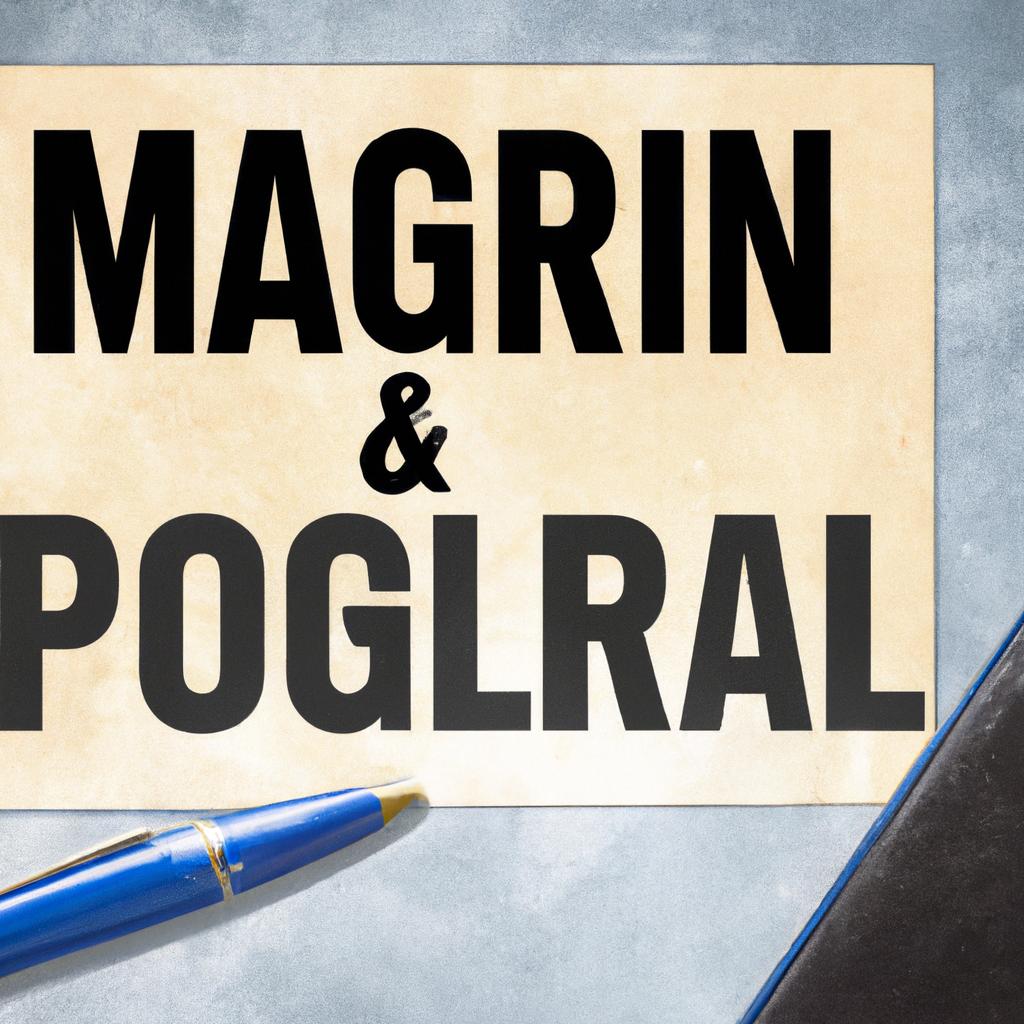Probate, a term commonly thrown around in legal circles, often conjures up feelings of confusion and uncertainty for those navigating the intricate world of estate planning. As seasoned practitioners of the law, we at Morgan Legal Group recognize the vital importance of understanding what is subject to probate. In this article, we will delve into the nuances of probate, shedding light on what assets and property fall under its jurisdiction. Join us as we unravel the complexities of probate, providing clarity and guidance for those seeking to secure their legacies and protect their loved ones.
Understanding the Scope of Probate
In the realm of probate, it is crucial to understand the scope of assets that are subject to the probate process. Probate typically applies to the following types of assets:
- Real estate that is solely owned by the deceased individual
- Bank accounts that do not have a designated beneficiary
- Investment accounts held solely in the deceased individual’s name
- Personal property such as jewelry, artwork, and vehicles
- Business interests held solely by the deceased individual
On the other hand, assets that are not subject to probate include:
- Property held in joint tenancy or as tenants by the entirety
- Retirement accounts with designated beneficiaries
- Life insurance policies with named beneficiaries
- Trust assets held in a living trust
- Assets that pass by operation of law, such as payable-on-death accounts

Key Assets Subject to Probate
Probate is the legal process of administering a deceased person’s estate. During probate, certain assets are subject to court supervision to ensure they are distributed according to the deceased’s will or state law. Understanding which assets are subject to probate is crucial for estate planning purposes. Here are some key assets that typically go through probate:
- Real Estate: Any property solely owned by the deceased individual is subject to probate.
- Bank Accounts: Bank accounts held solely in the deceased’s name, without a designated beneficiary, are subject to probate.
- Personal Property: Assets such as vehicles, jewelry, and furniture that are solely owned by the deceased are subject to probate.
| Asset Type | Probate Status |
|---|---|
| Real Estate | Subject to Probate |
| Bank Accounts | Subject to Probate |
| Personal Property | Subject to Probate |

Strategies to Avoid Probate
When planning your estate, it is important to consider which assets may be subject to probate. Probate is the legal process in which a court oversees the distribution of a deceased individual’s assets. Assets that are subject to probate include:
- Real Estate: Any property solely owned by the deceased individual.
- Bank Accounts: Accounts held solely in the deceased individual’s name.
- Personal Property: Items such as jewelry, vehicles, and household goods.
- Investment Accounts: Stocks, bonds, and other securities held solely by the deceased individual.
By implementing strategies such as creating a living trust, designating beneficiaries on accounts, and gifting assets during your lifetime, you can help avoid the probate process and ensure a smooth transfer of assets to your loved ones. Consulting with an experienced estate planning attorney can help you create a comprehensive plan to minimize probate and protect your assets for future generations.

Seeking Professional Guidance from Morgan Legal Group
Probate is the legal process that takes place after someone passes away. During this process, a deceased person’s assets are distributed to their heirs and beneficiaries. However, not all assets are subject to probate. It is important to understand what assets are subject to probate and which ones are not, as this can impact the distribution of the estate.
Assets that are typically subject to probate include:
- Real estate owned solely by the deceased
- Bank accounts held solely in the deceased person’s name
- Stocks and bonds held in the deceased person’s name
On the other hand, assets that are not subject to probate include:
- Life insurance policies with named beneficiaries
- Retirement accounts with designated beneficiaries
- Property held in a living trust
Q&A
Q: What is subject to probate?
A: Probate is the legal process where a deceased person’s assets are distributed according to their will or state law. Anything owned solely in the deceased person’s name is subject to probate.
Q: What are some examples of assets subject to probate?
A: Assets that are typically subject to probate include real estate, vehicles, bank accounts, stocks, and other investments held solely in the deceased person’s name.
Q: Are there any assets that are not subject to probate?
A: Yes, assets that are held jointly with rights of survivorship, assets held in a trust, life insurance policies with named beneficiaries, retirement accounts with designated beneficiaries, and assets transferred outside of probate through a transfer on death or payable on death designation are not subject to probate.
Q: Why is it important to understand what is subject to probate?
A: Understanding what assets are subject to probate can help individuals plan their estate to avoid unnecessary delays, expenses, and potential conflicts among family members.
Q: How can individuals minimize assets subject to probate?
A: Individuals can minimize assets subject to probate by creating a comprehensive estate plan, including establishing a trust, naming beneficiaries on accounts, and ensuring joint ownership of assets with rights of survivorship.
Q: Is probate necessary for all estates?
A: Probate may not be necessary for small estates or estates where the deceased person had a comprehensive estate plan in place to transfer assets outside of probate. However, probate is required in most cases to legally transfer ownership of assets.
In Retrospect
In conclusion, understanding what is subject to probate is crucial for anyone seeking to plan their estate and ensure their loved ones are provided for in the event of their passing. By identifying assets that are subject to probate and taking the necessary steps to address them, individuals can help streamline the probate process and avoid unnecessary delays and expenses for their beneficiaries. Remember, when it comes to estate planning, knowledge is power. Stay informed, stay prepared, and rest easy knowing your legacy is in good hands.
 Subject to Probate: Understanding the Process and What it Involves
Subject to Probate: Understanding the Process and What it Involves
When a person passes away, their assets, or everything they own, need to be distributed to their heirs or beneficiaries. This process is known as probate and is governed by state laws. While the probate process is often seen as lengthy and complicated, it is important for individuals to understand what it entails and how it may affect their loved ones and their assets.
In this article, we will discuss what exactly is subject to probate, the steps involved in the process, and any potential alternatives that may exist. We will also explore the benefits and practical tips for navigating the probate process and share some real-life case studies.
What is Probate?
Probate is a legal process that takes place after a person’s death and involves the court overseeing the distribution of their assets. This process is initiated by the executor, or personal representative, named in the deceased individual’s will or appointed by the court if there is no will.
The main purpose of probate is to ensure that the deceased person’s debts and taxes are paid, and their assets are distributed to the rightful heirs or beneficiaries. The probate court is responsible for supervising this entire process.
What is Subject to Probate?
Not all assets are subject to probate. Some examples of assets that usually do not go through probate include:
– Assets held in joint tenancy: If the deceased person co-owned an asset with someone else, such as a joint bank account or property, that asset typically goes to the surviving owner without going through probate.
– Assets with a designated beneficiary: Some assets, such as life insurance policies, retirement accounts, and payable-on-death (POD) bank accounts, allow the account owner to designate a beneficiary who will inherit the asset upon their death. These assets do not go through probate.
– Trust assets: If the deceased individual had a trust in place, any assets held in that trust will not go through probate. Instead, they will be distributed according to the trust’s terms.
– Assets held in survivorship community property: Some states recognize survivorship community property, where spouses co-own all of their assets and automatically inherit each other’s share upon death without going through probate.
– Small estates: Many states have small estate procedures that allow heirs to receive property without the need for full probate if the value of the estate falls below a certain threshold.
On the other hand, assets that are solely owned by the deceased person and do not have a designated beneficiary or co-owner will most likely go through probate. These assets can include bank accounts, real estate, vehicles, and personal belongings.
What are the Steps Involved in Probate?
The probate process varies from state to state, but in general, it involves the following steps:
1. Filing the will: If there is a will, the executor must file it with the probate court in the county where the deceased person lived. If there is no will, someone will need to step forward to be the personal representative and be appointed by the court.
2. Notifying heirs and creditors: The executor must notify all known heirs and potential beneficiaries of the death and initiate the process of gathering the deceased person’s assets. They must also publish a notice in the local newspaper to alert creditors of the death and give them a chance to make a claim against the estate.
3. Valuing the assets: The executor is responsible for taking an inventory of all the deceased person’s assets and getting them appraised if necessary. This could include getting a professional appraisal for any valuable property or hiring a financial advisor to determine the value of investments.
4. Paying debts and taxes: Before any assets can be distributed to heirs, the executor must pay any outstanding debts and taxes owed by the estate. This could include medical bills, credit card debt, and income or estate taxes.
5. Distributing the assets: Once all debts and taxes have been paid, the executor can distribute the remaining assets to the heirs according to the deceased person’s will or state laws if there is no will. This distribution must be approved by the probate court.
6. Closing the estate: After all assets have been distributed, the executor must file a final accounting with the court, showing how the assets were distributed and accounting for any fees paid during the probate process. Once the court approves the final accounting, the estate is closed.
Alternative Options to Probate
While probate is the most common method for distributing assets after someone’s death, there are alternative options that can be used to avoid the probate process. These can include:
– Creating a revocable living trust: This allows assets to pass directly to beneficiaries without going through probate. The trust also allows the grantor to maintain control over their assets while they are alive and able to make decisions.
– Joint ownership: As mentioned earlier, assets held in joint tenancy or with a designated beneficiary do not go through probate.
– Gifting assets: If the deceased person gifted assets to their heirs during their lifetime, those assets are not subject to probate.
– Payable-on-death accounts: As mentioned earlier, bank accounts with a designated payable-on-death (POD) beneficiary do not go through probate.
Benefits of Avoiding Probate
One of the main benefits of avoiding probate is that it can save time and money. Probate can be a lengthy process, and the fees associated with it can add up quickly. By using alternative methods, such as a trust or joint ownership, heirs may receive their inheritances much faster.
In addition, avoiding probate can also provide greater privacy for the deceased individual’s assets and their beneficiaries. Probate is a public process, meaning that anyone can access the information about the assets and their distribution. Using alternative options can help keep this information private.
Practical Tips for Navigating the Probate Process
Here are some practical tips to keep in mind if you find yourself involved in the probate process:
– Consult with an attorney: Probate laws can be complex, and it can be beneficial to have an attorney guide you through the process.
– Keep thorough records: It is important to keep detailed records of all the assets, expenses, and distributions involved in the probate process.
– Communicate with beneficiaries: Keep beneficiaries informed of the progress of the probate process to avoid any misunderstandings or disputes.
– Seek professional help: If you are appointed as an executor and are not familiar with the process, consider hiring an estate attorney, accountant, or financial advisor to assist you.
Real-Life Case Studies
To put this information into perspective, here are two real-life case studies involving the probate process:
Case Study 1: John passes away, leaving behind a valid will and assets totaling $500,000. His estate goes through probate, and after all debts and taxes are paid, the remaining assets are distributed to his three children. The probate process takes six months to complete, and the final fees paid total $15,000.
Case Study 2: Sarah passes away, leaving behind a revocable living trust and assets totaling $500,000. Her estate bypasses probate, and the assets are distributed directly to her three children without any fees or delays. The entire process is completed within a month.
As you can see, avoiding probate can save time and money for both the deceased person’s estate and their beneficiaries.
In Conclusion
In summary, probate is a legal process that takes place after someone’s death and involves the court overseeing the distribution of their assets to their heirs or beneficiaries. The assets subject to probate include solely owned assets without a designated beneficiary or joint owner. However, there are alternative options available to avoid probate, such as creating a trust or using joint ownership. It is important to understand the probate process and seek professional advice to navigate it successfully. By doing so, you can ensure that your assets are distributed according to your wishes while minimizing any delays or expenses for your loved ones.

